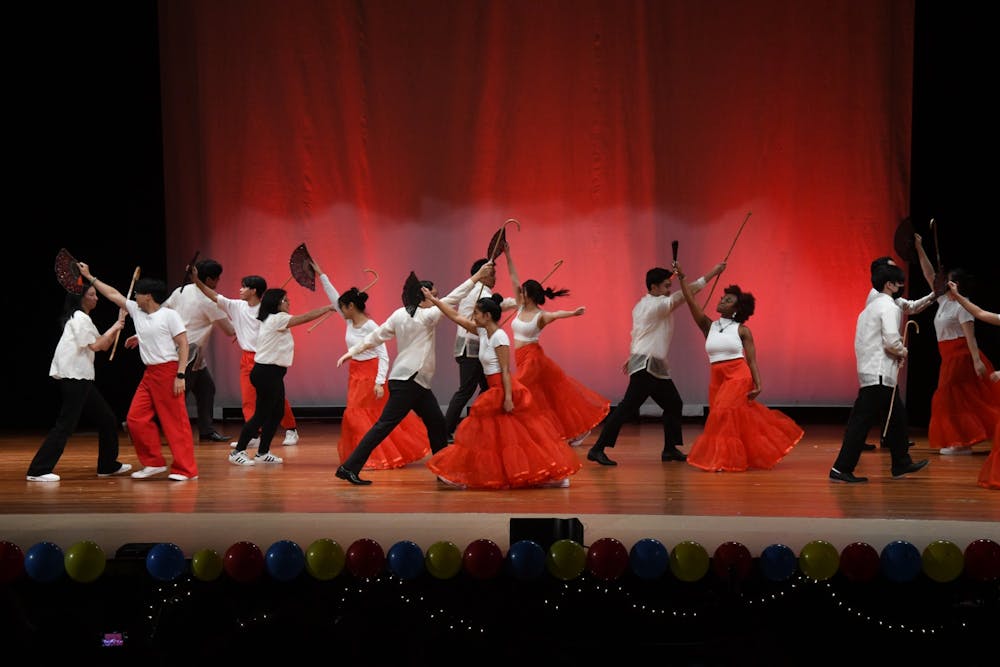After a worldwide pandemic shut down the event in 2020 and forced it online in 2021, the Organization of Young Filipino Americans held its annual Barrio Fiesta in person for the first time since 2019. The Barrio Fiesta gathered University students, alumni and parents together under one roof to experience a taste of home. Located in the Martin Luther King, Jr. Performing Arts Center, students joined for the performance April 9 from 2 p.m. to 5 p.m.
OYFA was established in 1988 with a mission to create an inclusive community for Filipinos at the University to learn more about Filipino culture and traditions. It continues to thrive in the University and Charlottesville communities to this day and its 2022 Barrio Fiesta included a combination of film, dance and traditional food in a spectacular showing of Filipino culture.
One notable aspect of the event was that members of the OYFA community made sure to offer authentic Filipino homemade meals as they have at other OYFA events. Most of the meals were credited to the generous donations of parents in the Charlottesville community who came to support their students, and some additional food was brought in from Manila Street — a popular Filipino food truck and restaurant at Charlottesville’s Dairy Market.
Lauren Manuel, fourth-year College student and OYFA culture chair, was determined to make sure this year's Barrio would be the one that nobody forgets. After seeing all of OYFA's hard work for Barrio 2020 crushed by the pandemic, Manuel was set on being reelected as a chairholder to host an event that united the Filipino community.
"This past year, we've been working really hard on just trying to make this first in-person Barrio Fiesta in three years the best one it's ever been," Manuel said. "It is like com[ing] back to fruition, and now we're hosting the first in-person Barrio since 2019. And we feel like a lot of our personal experiences, especially with what happened during COVID, have really built up to this moment."
Each year, OYFA holds their Barrio Fiesta in accordance with a theme based on a Filipino word. This year's Filipino word is “tadhana,” which implies destiny. They took this word and attempted to center it around issues of classism and colorism.
Manuel reflected on the importance of this theme as a way to combat generational stereotypes and beliefs that often confine Filipino and other Asian-Americans to certain destinies. An example of such stereotypes addressed during the course of the event was the misconception in Asian countries — and particularly in the Philippines — that if a person’s skin is darker, then they are from a poorer region of the Philippines.
“Our whole [skit] centers around learning that we need to be more understanding and we can create a new destiny for our culture that … doesn't confine us to all of these like deeper issues and beliefs that a lot of our families and generations before us had been raised [on] and kind of have had ingrained into our minds,” Manuel said.
The performance opened with a short film on a Filipino folktale of Daragang Magayon — a beautiful young girl who fell in love with a native warrior of another tribe. Unfortunately, their shared forbidden love created major tension between the two tribes, which led to the two lovers' deaths. The film then skillfully transitioned to a skit about a modern-day story that focused on the themes of colorism and classism, particularly how it is embedded in the Filipino and Filipino-American culture.
It was OYFA's goal to shed light on the ongoing issues within their community, and the organization attempted to tackle these issues through the comedic yet lighthearted skit. In addition, the skit also attempted to prompt audience members to reflect on their own culture and notice certain stereotypes upon which they have personally stumbled.
“We implemented a lot of ‘aha’ moments in this skit where we feel a lot of the people watching will resonate…and a lot of the parents or maybe older generations of families that come to watch will [say to themselves], ‘Wow, I did that, and that has had such a big impact on … how my child sees their culture and sees their destiny being shaped by the Filipino culture,’" Manuel said.
The theatrical skit was followed by traditional folk dances like Tinikling, Singkil, Paso Doble, Pandanggo Sa Ilaw and Imunan. The folk dances were later followed by modern American dances and music to show that they are not only here to celebrate Filipino culture but also proud to be Filipino-American.
Anh Nguyen, third-year College student and choreographer, loved seeing her choreography come to life through this show despite not identifying as Filipino. She and other choreographers worked hard to display Filipino cultural dances and popular American dances.
"I don't really identify as Filipino,” Nguyen said. “I am Vietnamese, but I enjoyed learning about different parts of my identity and seeing everyone come together. I enjoyed experiencing another culture and seeing everything coming together so well.”
Individuals who were not a part of the performance were still able to see the event come to life and support the performers, as they applauded and praised the upbeat performance. Third-year College student Gabriella Hale attended the event to support her friend who was a performer and hoped to learn more about her culture.
"I'm not Filipino,” Hale said. “I just wanted to be here to support my friend, and it was really nice to get to see her culture, especially since I never really encountered Filipino culture beforehand. The dancing was a lot of fun to watch.”
Since the beginning of the spring semester, OYFA members have been rehearsing the choreography for the performance. In addition, OYFA members like first-year College student Bernard Gonzales, who choreographed and performed in the show, put in several hours to make sure his first Barrio Festival was memorable for him and others. Gonzales joined OYFA to find a community at the University and through this organization he was able to share a piece of his identity with others.
"I felt really happy that I could share my culture with other people who didn't really see that and like the folktale that was in there,” Gonzalez said. “I got to learn more about my own culture, but I also got to share my culture with other people who, you know, don't really know what being Filipino is or what it's like, and I was really glad [to do so]."
The event was not only a celebration of Filipino culture, but it was also a commemoration of all the hard work that the members of OYFA have put into the organization. In addition, it served as a farewell to the graduating class of 2022 with heartwarming speeches from position holders in OYFA. In one event, OYFA pushed audience members to disassemble untruthful beliefs while uplifting the community’s vibrant culture.
“Barrio Fiesta, in general, is the most anticipated event of each school year for the Organization of Young Filipino Americans,” Manuel said. “It's really an effort for all of us to promote and showcase the beauty and diversity of the Filipino culture to both the U.Va. communities and the Charlottesville communities.”







